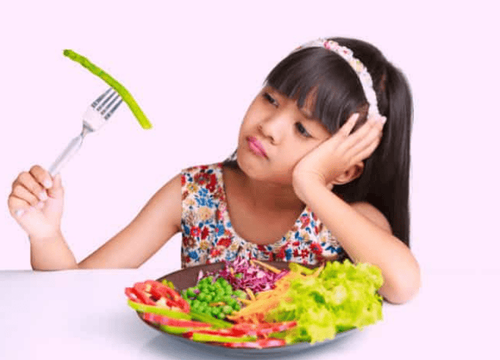This is an automatically translated article.
The article was professionally consulted with Doctor Ho Thi Hong Tho - Neonatologist - Pediatrics - Neonatology Department - Vinmec Phu Quoc International General Hospital.You cannot expect a preschooler to eat a variety of foods. A good way to help a picky 2-year-old is to consistently cook and enjoy healthy foods to set an example. 3-year-old anorexic children also have the right to decide for themselves the type and amount of food they want to eat at each meal.
1. Why are children picky eaters?
It's completely normal for preschoolers to dislike the shape, color, or texture of food. Even she suddenly decides to hate everything, even the things she loved yesterday. Most kids this age are addicted to unhealthy junk food. Sometimes children insist on eating only one dish at each meal.Nutritionists say this condition is called: fear of new things. This is one of the “odds” that humans evolved to protect themselves as humanity evolved. Specifically, you don't want to try new things because you don't know if it's safe or not.
The fear of new things usually subsides by the time the child is 4-5 years old. However, some 4-year-olds who are picky eaters continue to do so into adulthood. From bedtime routines to eating patterns, your child may prefer only the familiar and in a consistent sequence. Children are not ready to try new foods until you have cooked them many times.
Picky eaters can also be preschoolers' way of declaring their independence: You can't make them eat that food. This case has little to do with old or new foods, but mainly the baby wants to test the limits of his parents and assert control over his own life.
Finally, because preschoolers are so mischievous, they can't sit still for long to eat a full meal. In this case, you need to keep your child interested in food longer by choosing a fixed, quiet and not rushed mealtime. Don't let an anorexic 3-year-old be disturbed or distracted by toys, TV, or pets while they're eating.

Việc trẻ mẫu giáo không thích hình dạng, màu sắc hoặc kết cấu của thực phẩm là điều hoàn toàn bình thường
2. Tips for introducing new foods to picky eaters
Children have an innate sense of how much food their bodies need to grow and stay healthy, so it's up to you to decide what to eat. The best thing parents can do is offer a variety of healthy foods in a positive, comforting way that makes mealtime enjoyable. Here are some picky 2-year-olds that you can refer to:Feed your preschooler a variety of foods at each meal Be patient as you may have to serve the same food more than once then I'm ready to try. When you introduce a new dish, just put it on the table along with other dishes, don't stress your child has to try it. Putting new foods right on a child's plate can make him rebellious or feel threatened. After seeing you eat it a few times, an anorexic 3-year-old may gradually become more comfortable trying it.
Serve children's servings Children's servings are only half the size of an adult's, about the size of your child's palm. Examples of servings for children are 1/2 cup of rice or yogurt, 2 ounces of meat, 4 tablespoons of vegetables, and a slice of bread.
Don't give preschoolers too many options If you ask: What do you want for lunch today? Most likely, the child will choose a familiar dish, turning himself into a picky eater. But if you just say, “This is your dinner,” your baby is forced to eat what you cooked. Note, do not cook a full meal of new foods, but always include at least one favorite and familiar dish.
Introduce a little new food When your child wants to try a new food, give him only a small taste and let him ask for more. This way, your child will feel more in control, and you won't waste it if he refuses to eat. When your baby is hungry but hasn't had a meal yet, take advantage of the opportunity to try a new food, such as a slice of mango in the afternoon.
Children with a sensitive palate Not only does it taste when put in the mouth, many children also dislike the texture, color or smell of some foods. That's why kids can claim they don't like the food even though they've never tried it. Similarly, some children may refuse a food because it reminds them of a time when they were sick or has some other negative association. If your preschooler says a particular food will make him or her sick, stop cooking the food for a while. You can try again when your baby is a little older.
Regularly let your lazy 4-year-old go grocery shopping, help prepare meals and snacks If your child can help you grow and harvest some vegetables in your garden, even better. This gives children a sense of control over their diet, and they are more likely to eat foods they choose to buy or prepare themselves. To be more effective, limit your child's choices instead of making requests in general. Make healthy treats together like colorful fruit mix with yogurt, peanut butter and raisins on top of vegetable sticks.
Find ways to increase the nutritional value of your child's favorite foods. For example, add some tuna or ham to your child's grilled cheese, or add meat or tofu in a pasta sauce.
Teach your child about healthy nutrition Hang a calendar in the kitchen and color it like the food he eats every day. This will encourage your child to eat a variety of foods so that the calendar is full of color. Regularly tell your child that eating oatmeal will help him or her run better the next morning.
Be a good role model and eat what you want your child to eat Family mealtime is a great opportunity to connect with a picky 2-year-old and share fun and nutritious foods together.
Don't indulge your preschooler's picky eater Your child is now old enough to be able to eat without having to cut his bread into the shape of a star or a moon to satisfy his cravings. The world of children starting kindergarten gradually expands, since then the taste for foods is also diverse. It's not uncommon for your child to be less picky at school than at home.

Thường xuyên cho trẻ 4 tuổi lười ăn đi mua sắm thực phẩm, phụ chế biến các bữa chính
3. Notes when raising picky eaters
According to a nutritionist, 3-year-old anorexic children need to control what they put into their body. If you force your preschooler to eat foods he doesn't like or eat more than he wants, he may have problems later on. Specifically, children who are never allowed to make their own decisions about the type and amount of food are more at risk of developing an eating disorder or becoming obese. Furthermore, the coercive strategy almost always backfires, only making the child more stubborn and unwilling to try new things in the future.If your child eats nothing but cheese and crackers for days in a row, don't worry. As you begin to document your child's menu, you'll likely find that your child has eaten all of the major food groups and gotten all the nutrition he needs throughout the week. According to research, children who are rated picky by their parents still consume a variety of foods to meet their nutritional needs. If you really think your child's diet is not good, consult your doctor about giving your child a daily multivitamin.
Don't panic if your preschooler seems to be developing slowly. Children don't always develop at a steady rate, and there will even be times when your child doesn't grow at all.

Nếu bạn thường xuyên kêu ca và than thở vào giờ ăn, trẻ 4 tuổi lười ăn có nguy cơ trở nên kén ăn hơn
In the case of children with anorexia, prolonged picky eating, malabsorption, growth retardation, parents should supplement children with supportive products containing lysine, essential micro-minerals and vitamins such as zinc, chromium, selenium, B vitamins help meet the nutritional needs of children. At the same time, these essential vitamins also support digestion, enhance nutrient absorption, help improve anorexia, and help children eat well. Parents can simultaneously apply dietary supplements and functional foods derived from nature for easy absorption. The most important thing is that improving your baby's symptoms often takes a long time. The combination of many types of functional foods at the same time or continuously changing many types in a short time can cause the baby's digestive system not to adapt and completely not good. Therefore, parents must be really patient with their children and regularly visit the website vimec.com to update useful baby care information.
Reference source: babycenter.com














